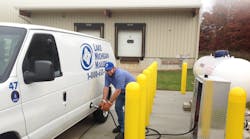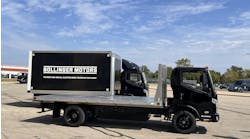Among the considerations fleets must review before switching to an alternative fuel are vehicle miles driven in a day, total cost of ownership, infrastructure improvements, and fuel price. For some fleets, answering that quartet of questions opens a number of possibilities. For Lake Michigan Mailers, though, the answers led to a single conclusion.
“Not only did propane autogas fulfill all of our requirements, but a study showed it would give us the fastest return on our investment,” says David Rhoa, president. “When we saw the results, we were absolutely convinced that propane autogas was the most viable option for our needs.”
A typical Ford E-150 van in Lake Michigan’s 30-vehicle fleet runs more than 100 mi. a day, making electric vehicles an impractical option, Rhoa says. Compressed natural gas was rejected because of the costs associated with building a supporting infrastructure for a fleet the size of Lake Michigan. The E85 blend of gasoline was also not a viable solution because fewer Michigan gas stations support that fuel. But propane was the answer to each question asked. With the help of propane supplier AmeriGas, which has installed a 1,000 gal. propane autogas tank at Lake Michigan’s Kalamazoo, MI, facility, the company is on its way to a fleet conversion.
“The filling time is the exact same with gasoline and propane autogas,” Rhoa says. “In fact, our drivers are saving time because they’re not leaving the property and waiting in line to fill up at a gasoline station. When they leave the facility, they’re full and ready to go.”
The company, a family-owned operation that provides data and document management, mail assembly and other business support services in Michigan and Indiana, initially outfitted a single vehicle with the Icom North America JTG II bi-fuel liquid injection system, which also allows the vans to operate on gasoline as needed. Since then, six additional vans have been converted and Rhoa expects 22 of the company’s vehicles to be equipped by June 2014.
The JTG II system is a “plug-and-play” solution with the fuel tank, fuel rails, and hoses preassembled.
COMMON SENSE
“The decision to switch more of our fleet to bi-fuel in the future was a no-brainer after we saw the cost savings of converting the initial vehicle,” Rhoa notes. “All indications are that we are on pace to hit return-on-investment goals.”
Those goals include a quick payback on the $6,300 system.
“The savings on a single bi-fuel vehicle running 25,000 mi. typically covers the conversion cost within the first year,” Rhoa says. “After that, the bi-fuel vehicle essentially pays back dividends to the company over the next three years.”
Lake Michigan runs its vehicles on propane approximately 99% of the time, switching only to gasoline on days when a route is longer than normal. The company says that, despite a 7% increase in the price of gasoline, it recorded a 50% decrease in fuel expenses for the equipped vehicles within the first nine months of 2012.
Rhoa estimates the company is saving 12¢/mi. by using propane autogas over gasoline.
Drivers report that the vehicles suffer from no decline in performance, torque or horsepower, Rhoa says. Of course, there is also a positive environmental component to using propane autogas, but that is not what initially attracted Lake Michigan Mailers.
“Though propane autogas is a part of Lake Michigan Mailers’ sustainability program, it was not the environmental green, but the monetary green, that ultimately led us to choose and stick with propane autogas,” Rhoa says.



